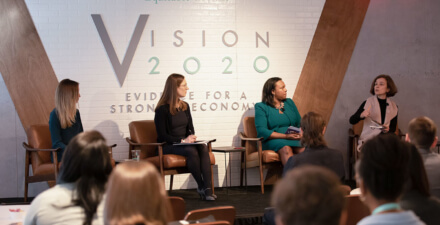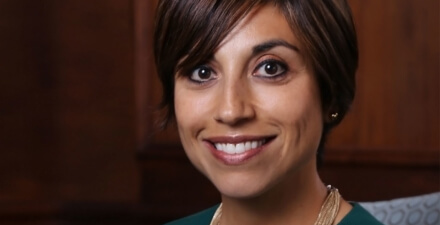Expert Focus: Women’s History Month

Equitable Growth is committed to building a community of scholars working to understand whether and how inequality affects broadly shared growth and stability. To that end, we have created a new monthly series, “Expert Focus.” This series will highlight scholars in the Equitable Growth network and beyond who are at the frontier of social science research. We encourage you to learn more about both the researchers featured below and our broader network of experts.
In honor of Women’s History Month, the first installment of this series highlights the contributions and achievements of women scholars in our network and beyond. Both together and in their respective fields, these experts are changing the way we think about economic inequality and growth, and providing strong examples for and of women in the social sciences.
Nina Banks
Bucknell University
Nina Banks is an associate professor of economics at Bucknell University and a critical voice on the experience of individuals and families in the U.S. economy—particularly the economic and political disparities faced by people of color and by women (and especially by women of color). She is the co-author of the forthcoming Black Women in the U.S. Economy: the Hardest Working Woman, and is currently working on a manuscript titled Gender, Race, and Environmental Activism: Women of Color Working for Tomorrow. She organized the first joint annual conference of the National Economic Association and the American Society for Hispanic Economists, as well as the most recent meeting in 2019, to strengthen and elevate new communities, topics, and methodologies within economic research. Equitable Growth was excited to include her as a speaker in our recent conference, “Vision 2020: Evidence for a Stronger Economy,” which was designed to help inform economic policy ideas in advance of the 2020 elections. Banks told the story of Sadie Alexander, the first African American woman to receive a Ph.D. in economics in the United States, who advocated for full employment policies that are enjoying renewed attention in the current economic and political debate.
Mehrsa Baradaran
University of California, Irvine
Mehrsa Baradaran, a professor at University of California, Irvine School of Law, is a leading scholar on banking law and financial history. She recently joined the Board of Directors at The Washington Center for Equitable Growth to help advance a new economic vision that addresses economic and racial inequalities in the United States. In her most recent book, The Color of Money: Black Banks and the Racial Wealth Gap, Baradaran exposes the historical role of anti-black racism and segregation in perpetuating the racial wealth gap, and boldly proposes more inclusive banking institutions and credit policies to promote upward mobility. As she proclaims in her book, “Americans must decide whether to keep embracing our history of racial tribalism or to shed these divisions and go forward as one people, indivisible.”
Robynn Cox
University of Southern California
Robynn Cox is changing our understanding of the social and economic consequences of mass incarceration and criminal justice policies in general. As an assistant professor at the University of Southern California and an Equitable Growth grantee, her research focuses on racial disparities in the criminal justice system and how to successfully transition individuals impacted by mass incarceration policies back into society, as well as analyzing the roots and effects of racial and economic inequality. In her policy essay for Equitable Growth’s recent publication, Vision 2020: Evidence for a stronger economy, Cox makes the case for addressing the role of racial bias in our criminal justice system and overcoming public biases that lead to the social exclusion of previously incarcerated individuals. As she states in the video below, “Because we don’t address our history of race, it permeates throughout society, to the point that we now see that racism is actually structural and embedded within many of our systems, such as the criminal justice system.”
Hilary Hoynes
University of California, Berkeley
Hilary Hoynes, the Haas Distinguished Chair in Economic Disparities and professor of economics and public policy at the University of California, Berkeley, has deep research and policy expertise on poverty, inequality, food and nutrition programs, and the impacts of government tax and transfer programs on low-income families. An Equitable Growth grantee, she was recently appointed to California Gov. Gavin Newsom’s (D) new Council of Economic Advisors, which will be co-chaired by Laura D. Tyson, a distinguished professor of the Graduate School at University of California, Berkeley and a former Equitable Growth Steering Committee member. Hoynes has worked with Equitable Growth on developing policy proposals to strengthen our nation’s Supplemental Nutrition Assistance Program and to discuss the economic debate about trade-offs between social safety net spending and labor market participation, including the role that the social safety net can play in a national emergency or when the next recession hits the U.S. economy.
Abigail Wozniak
Federal Reserve Bank of Minneapolis
Abigail Wozniak is a labor economist who has worked extensively to further our understanding of the labor impacts of geographic mobility, job transitions, migration, and racial disparities. In February 2019, she became the first director of the Federal Reserve Bank of Minneapolis’ Opportunity & Inclusive Growth Institute. An Equitable Growth grantee, she was previously associate professor of economics at the University of Notre Dame and a senior economist in the White House Council of Economic Advisers. For Wozniak, as she states in the video below, economic growth has historically “not been inclusive,” so “thinking harder” about how growth is more broadly shared should be a high priority.
Equitable Growth is building a network of experts across disciplines and at various stages in their career who can exchange ideas and ensure that research on inequality and broadly shared growth is relevant, accessible, and informative to both the policymaking process and future research agendas. Explore the ways you can connect with our network or take advantage of the support we offer here.







